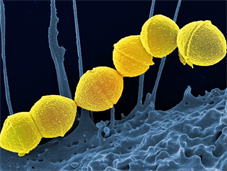Group A Streptococcus (Strep A)
08 December 2022 - Information and guidance

Parents and carers may be concerned by the news reports about Group A streptococcus.
Group A streptococcus (GAS) is a common bacteria. Lots of us carry it in our throats and on our skin and it doesn’t always result in illness. However, GAS does cause a number of infections, some mild and some more serious.
Scarlet fever is caused by group A streptococci. These bacteria also cause other respiratory and skin infections such as Strep throat and impetigo. Scarlet fever is usually a mild illness, but it is highly infectious.
In very rare occasions, the bacteria can get into the bloodstream and cause an illness called invasive Group A strep. Whilst still uncommon, there has been an increase in invasive Group A strep cases this year, particularly in children under 10.
We recommend parents and carers read the information below.
Spread and prevention
- GAS is spread by close contact with an infected person and can be passed on through coughs and sneezes or from a wound.
- Some people can have the bacteria present in their body without feeling unwell or showing any symptoms of infections and while they can pass it on, the risk of spread is much greater when a person is unwell.
- Good hand and respiratory hygiene are important for stopping the spread of many bugs.
- By teaching your child how to wash their hands properly with soap and warm water for 20 seconds, using a tissue to catch coughs and sneezes, and keeping away from others when feeling unwell, they will be able to reduce the risk of picking up, or spreading, infections.
What should parents look out for?
GAS infections cause various symptoms such as sore throat, fever, chills and muscle aches.
As a parent, if you feel that your child seems seriously unwell, you should trust your own judgement.
Contact NHS 111 or your GP if:
- your child is getting worse
- your child is feeding or eating much less than normal
- your child has had a dry nappy for 12 hours or more or shows other signs of dehydration
- your baby is under 3 months and has a temperature of 38C, or is older than 3 months and has a temperature of 39C or higher
- your child is very tired or irritable
Call 999 or go to the Emergency Department if:
- your child is having difficulty breathing – you may notice grunting noises or their tummy sucking under their ribs
- there are pauses when your child breathes
- your child’s skin, tongue or lips are blue
- your child is floppy and will not wake up or stay awake
Further information
- Information on scarlet fever from the Royal College of Paediatrics and Child Health.
- Group A Strep: What you need to know, a blog by the UK Health Security Agency.
- Suspected group strep A infection – King’s patient leaflet.
- Group A streptococcal infections: guidance and data from the Government.
